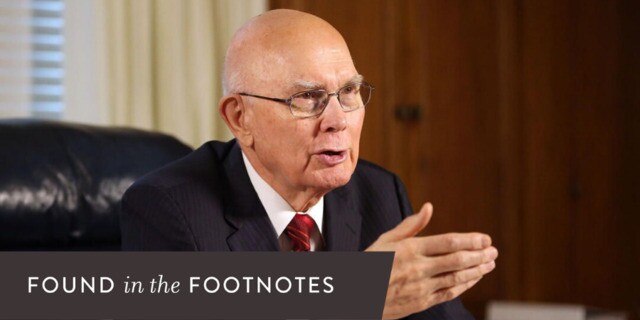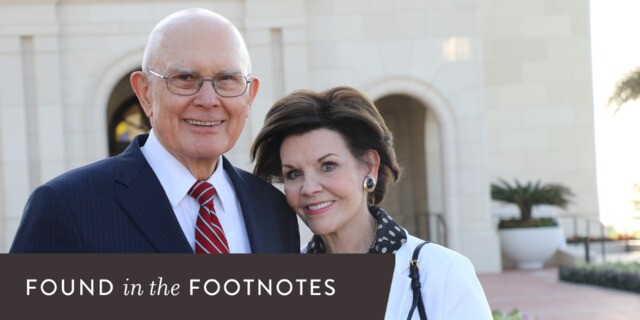Editor's note: Our bi-weekly Friday column, “Found in the footnotes,” explores some of the footnotes from remarks given by General Authorities and General Officers of The Church of Jesus Christ of Latter-day Saints.
I love finding out the moments when the paths of the General Authorities crossed long before they had their formal callings. For example, Elder Jeffrey R. Holland and Elder Quentin L. Cook were missionary companions in the early 1960s and they recently shared some of their experiences in new videos. When Elder D. Todd Christofferson served as a young missionary in Argentina, his mission president was Elder Richard G. Scott. And when Elder Neil L. Andersen served as a mission president in Bordeaux, France, President Elder Dallin H. Oaks, then a member of the Quorum of the Twelve Apostles, visited his mission and taught the missionaries what it meant to pray in real intent.
In a footnote of Elder Andersen’s April 2020 general conference talk, Elder Andersen shares the following:
“President Dallin H. Oaks visited our mission in Bordeaux, France, in 1991. He explained to our missionaries that real intent means that the person praying is saying to the Lord something like this: ‘I do not ask out of curiosity but with total sincerity to act on the answer to my prayer. If Thou wilt give me this answer, I will act to change my life. I will respond.’”
When I found this footnote, two words stuck out to me: act and respond. Praying with real intent means praying with total sincerity to act and respond. I also find it powerful that President Oaks used the word, “will.”
It caused me to question, in a year where the prophet has invited us to “hear Him,” am I praying with real intent? Am I praying with total sincerity to act and respond?
In his most recent general conference address, Elder Andersen said, “We hear Him in our prayers, in our homes, in the scriptures, in our hymns, as we worthily partake of the sacrament, as we declare our faith, as we serve others, and as we attend the temple with fellow believers. Spiritually defining moments come as we prayerfully listen to general conference and as we better keep the commandments. . . . While we cannot choose the timing of receiving these defining moments, President Henry B. Eyring gave this counsel in our preparation: ‘Tonight, and tomorrow night, you might pray and ponder, asking the questions: Did God send a message that was just for me? Did I see His hand in my life or the lives of my [family]?’ Faith, obedience, humility, and real intent open the windows of heaven.”
I believe that, as Elder Andersen encouraged us, when we act on President Eyring’s preparatory invitation to pray and ponder and when we do so with real intent, we really can “open the windows of heaven.”
Another element that struck me about this footnote isn’t so much the teaching of the footnote, but the fact that Elder Andersen treasured this 1991 teaching from President Oaks. Nearly 29 years after President Oaks’s teaching, he is sharing it with the world in general conference. Though I do not know this for certain, I imagine Elder Andersen wrote down this teaching in France. In his April 2020 address, he likewise encourages us to remember our own spiritual experiences:
“Embrace your sacred memories. Believe them. Write them down. Share them with your family. Trust that they come to you from your Heavenly Father and His Beloved Son. Let them bring patience to your doubts and understanding to your difficulties. I promise you that as you willingly acknowledge and carefully treasure the spiritually defining events in your life, more and more will come to you. Heavenly Father knows you and loves you!”
I hope we can continue to seek more real intent in our prayers and when the windows of heaven open, I hope we embrace those sacred moments when we “hear Him.”
Lead image: Jason Swenson, Church News
Find more insights from Elder Andersen in The Divine Gift of Forgiveness. In this book, Elder Andersen writes especially to those who are "awakening" unto God—those who are just beginning to discover or who seek the divine gifts and power of repentance and forgiveness in their lives. The Divine Gift of Forgiveness is organized in such a way that readers can choose the section or chapter that applies most to them and study it without having to have read from cover to cover. Available now at DeseretBook.com.



